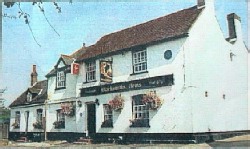
Photo and info reproduced by kind permission of the Landlord of the Blacksmiths Arms
 |
Map | Pubs page | Home | |
Photo and info reproduced by kind permission of the Landlord of the Blacksmiths Arms |
||
 KNOWN
AS the "Blacksmith's Arms"
was built during the reign of Charles I (1625 - 1649) in the year
1628. The property at this stage is described as a farm dwelling
with stables. The earliest recorded occupant is one Nathaniel
Myndecote, a farmer and blacksmith of the parish of Apuldrefield,
a title by which that area of Cudham was then known. Myndecote
purchased the property in 1638.
KNOWN
AS the "Blacksmith's Arms"
was built during the reign of Charles I (1625 - 1649) in the year
1628. The property at this stage is described as a farm dwelling
with stables. The earliest recorded occupant is one Nathaniel
Myndecote, a farmer and blacksmith of the parish of Apuldrefield,
a title by which that area of Cudham was then known. Myndecote
purchased the property in 1638.
A sale inventory of 1669 describes the property thus:- One messuage, four acres of arable land, one wooded parcel of land, one forge anvil and tack, two mares one in foal and at this date was purchased by one Henry Springett Lockyer, a blacksmith of the parish of Knockholt, who on his deathbed in 1703 bequeathed the property, then described solely as a blacksmith's forge and dwelling, to his wife Naomi, also recorded as a blacksmith.
Naomi Lockyer's maiden name was Ward, and in 1729 the property was purchased by one Marcus Ward, a beer retailer and blacksmith of the parish. The Ward family had for many years owned a registered ale house situated near the forge, known as the Anvil and later the Blacksmith's Arms, which was badly damaged by fire and demolished in 1721. On October the 10th 1729, an ale and cider licence was granted to a Marcus Ward, and in 1730, the sign of the "Blacksmith's Arms" was hung on the present site.
For many years, Marcus Ward continued his trade as a blacksmith, while his wife Eleanor ran the Inn. After his death in 1781, Eleanor Ward sold the property to one Henry George Wilson, an Innkeeper of Bromley for 100 guineas. In 1829, the Inn once again was in the hands of the Ward family when it was purchased by one Jonathan Ward, grandson of Marcus Ward.
In 1865, the "Blacksmith's Arms" was purchased by one Richard Relph. Relph's wife bore him fifteen children, one of whom, born at the Inn in 1868, named Harry went on to become famous as the legendary music stall star "Little Titch" (1868-1928).
In 1878, Richard Relph sold the Inn to one Charles Watson, town crier of Bromley. Watson was for many years a crier and post-master of the village and parish of Cudham, and the "Blacksmith's Arms" a posting house where the mail was left for Watson to distribute.
The "Blacksmith's Arms" has seen and undergone many changes since it was first built, but its historic atmosphere and character remains unchanged. So come and enjoy the fayre and reflect on those bygone days.